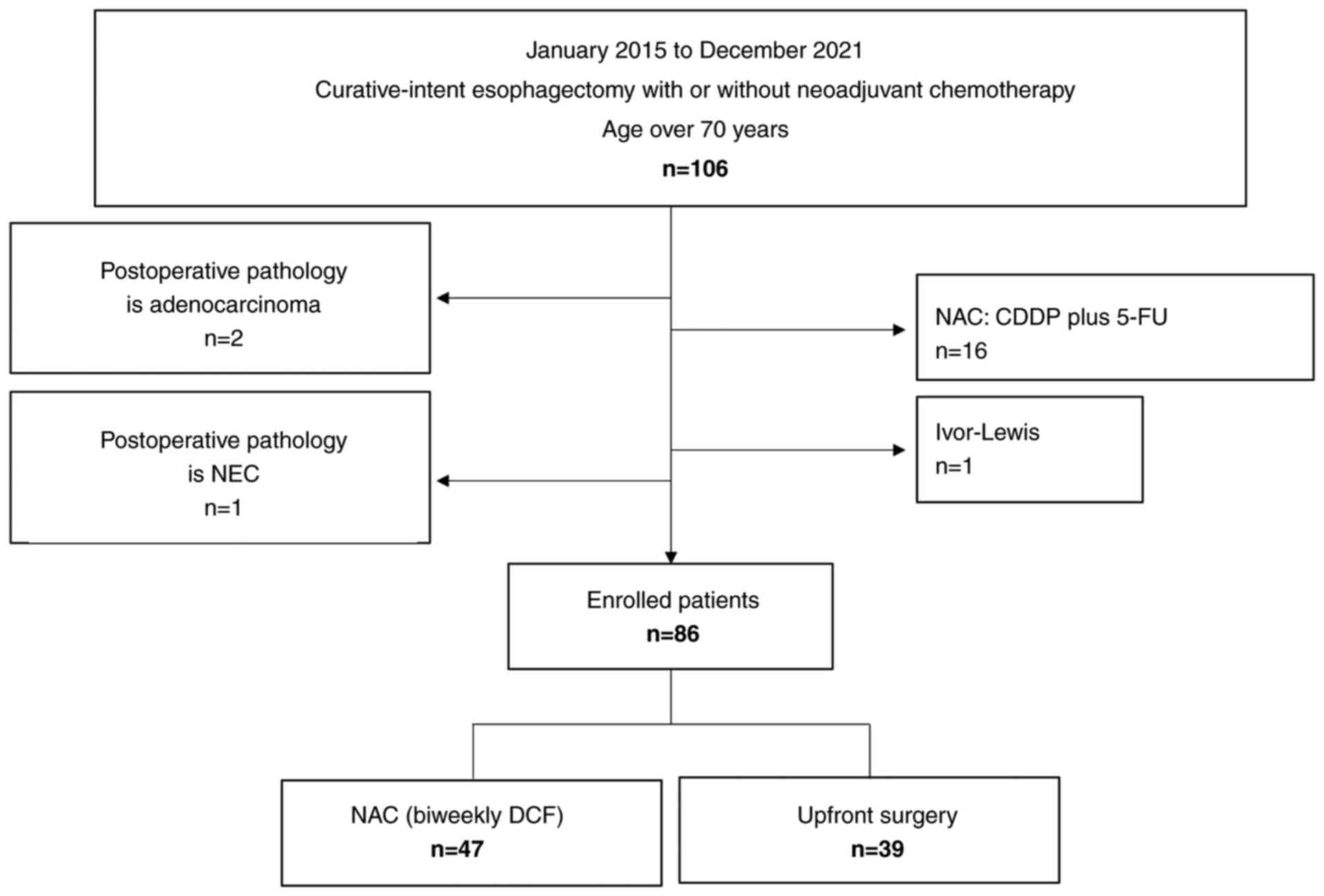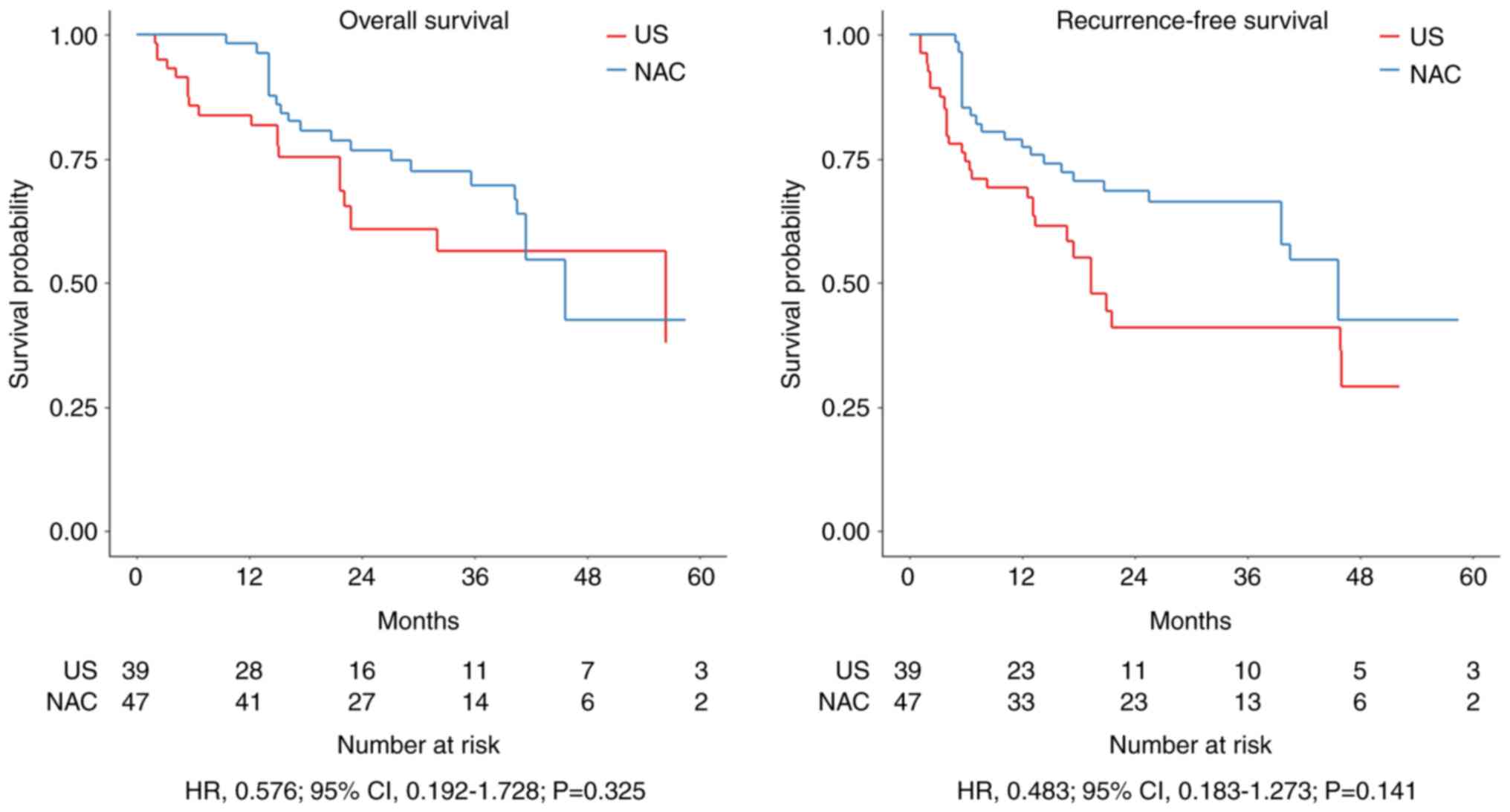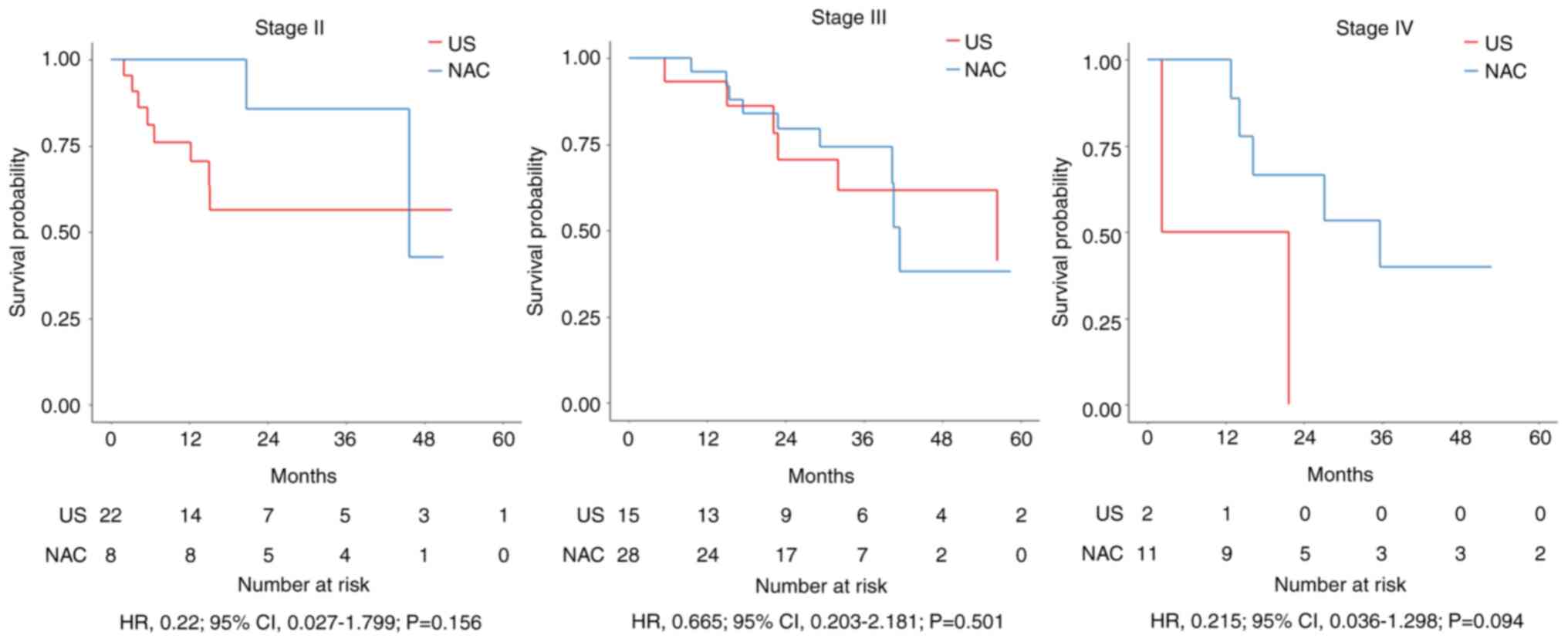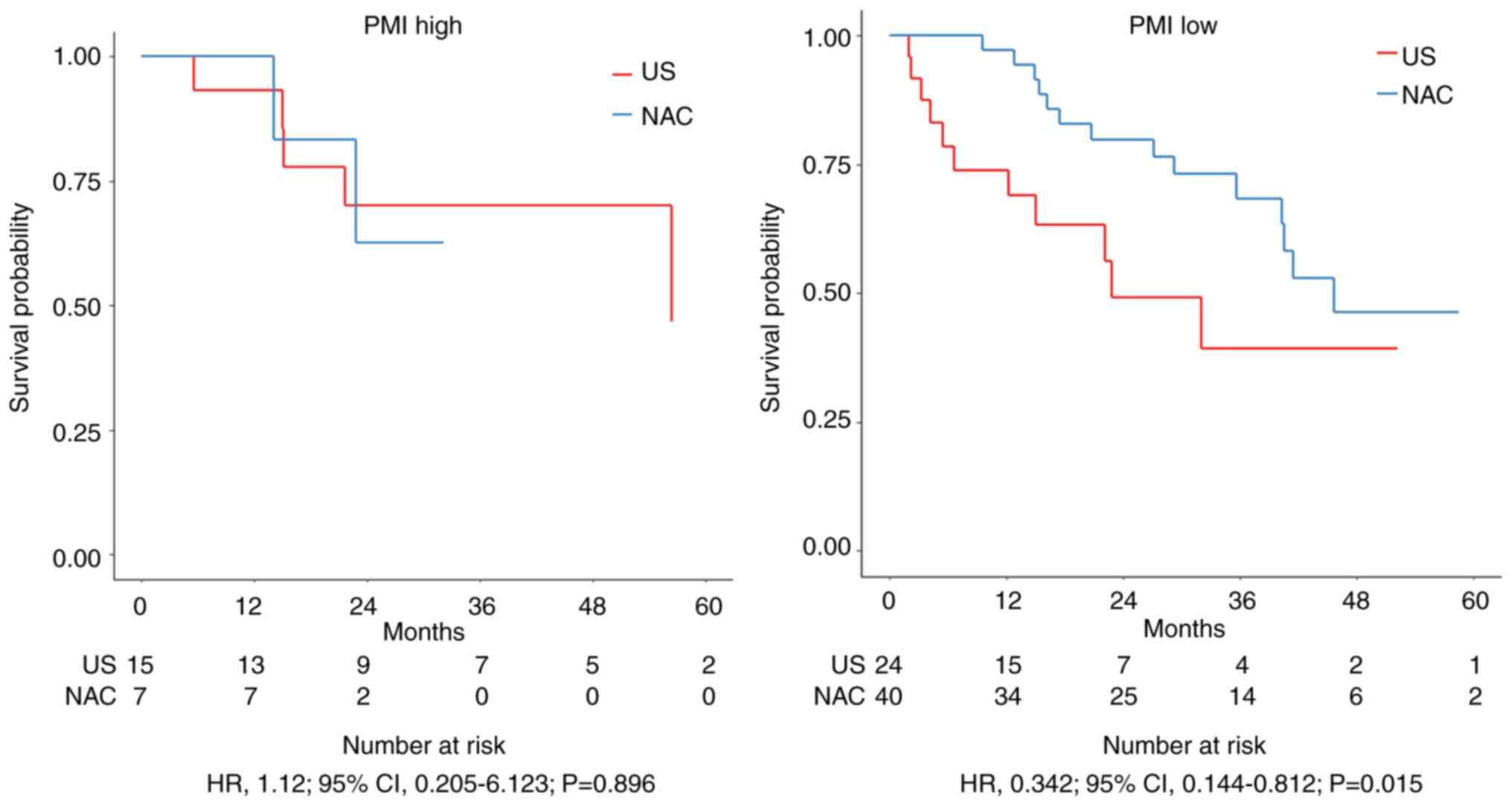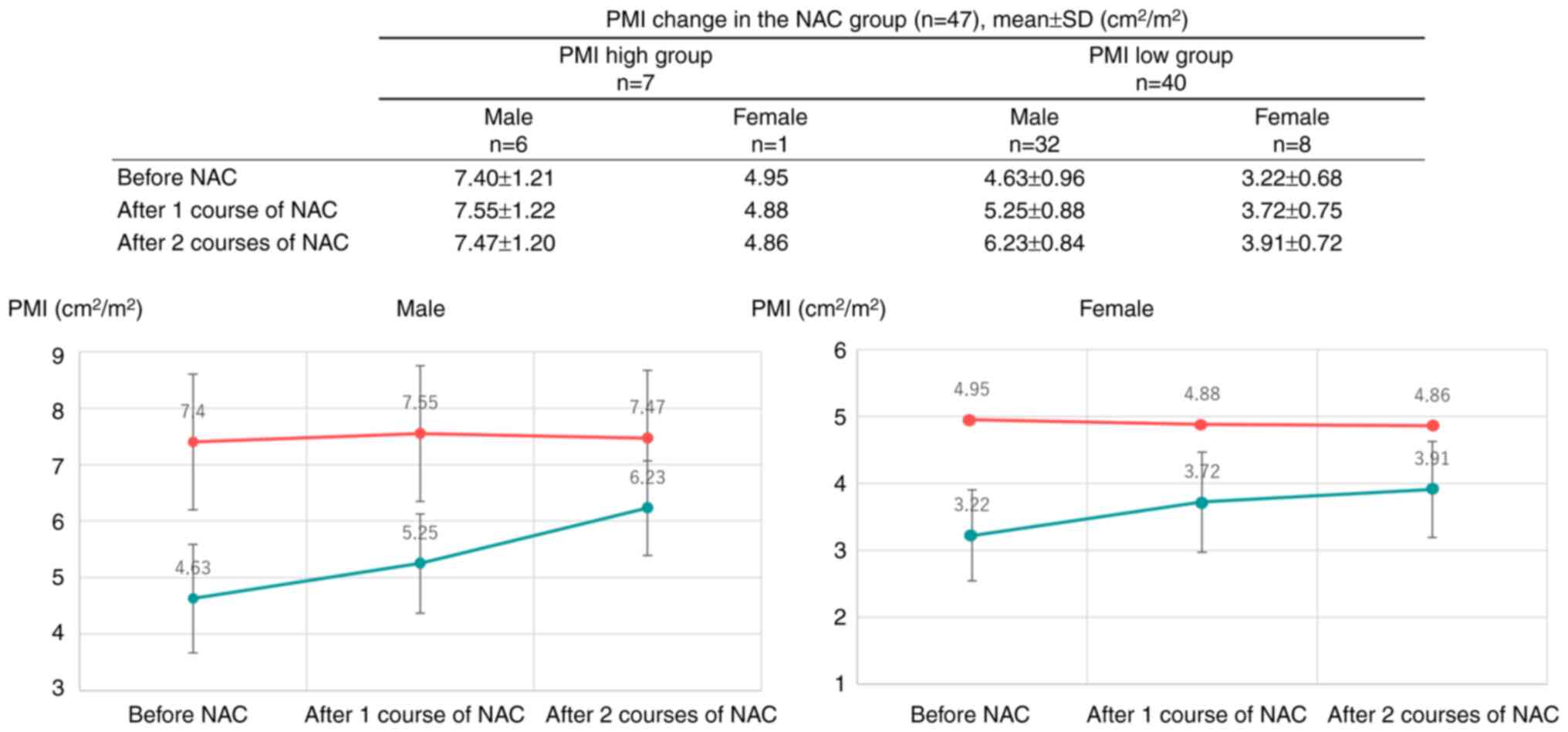|
1
|
Watanabe M, Toh Y, Ishihara R, Kono K,
Matsubara H, Miyazaki T, Morita M, Murakami K, Muro K, Numasaki H,
et al: Comprehensive registry of esophageal cancer in Japan, 2015.
Esophagus. 20:1–28. 2023. View Article : Google Scholar : PubMed/NCBI
|
|
2
|
Oguma J, Ozawa S, Ishiyama K and Daiko H:
Clinical significance of sarcopenic dysphagia for patients with
esophageal cancer undergoing esophagectomy: A review. Ann
Gastroenterol Surg. 6:738–745. 2022. View Article : Google Scholar : PubMed/NCBI
|
|
3
|
Ando N, Iizuka T, Ide H, Ishida K, Shinoda
M, Nishimaki T, Takiyama W, Watanabe H, Isono K, Aoyama N, et al:
Surgery plus chemotherapy compared with surgery alone for localized
squamous cell carcinoma of the thoracic esophagus: A Japan Clinical
Oncology Group Study-JCOG9204. J Clin Oncol. 21:4592–4596. 2003.
View Article : Google Scholar : PubMed/NCBI
|
|
4
|
Kitagawa Y, Ishihara R, Ishikawa H, Ito Y,
Oyama T, Oyama T, Kato K, Kato H, Kawakubo H, Kawachi H, et al:
Esophageal cancer practice guidelines 2022 edited by the Japan
esophageal society: Part 1. Esophagus. 20:343–372. 2023. View Article : Google Scholar : PubMed/NCBI
|
|
5
|
Kitagawa Y, Ishihara R, Ishikawa H, Ito Y,
Oyama T, Oyama T, Kato K, Kato H, Kawakubo H, Kawachi H, et al:
Esophageal cancer practice guidelines 2022 edited by the Japan
Esophageal Society: Part 2. Esophagus. 20:373–389. 2023. View Article : Google Scholar : PubMed/NCBI
|
|
6
|
Nakamura K, Kato K, Igaki H, Ito Y,
Mizusawa J, Ando N, Udagawa H, Tsubosa Y, Daiko H, Hironaka S, et
al: Three-arm phase III trial comparing cisplatin plus 5-FU (CF)
versus docetaxel, cisplatin plus 5-FU (DCF) versus radiotherapy
with CF (CF-RT) as preoperative therapy for locally advanced
esophageal cancer (JCOG1109, NExT study). Jpn J Clin Oncol.
43:752–755. 2013. View Article : Google Scholar : PubMed/NCBI
|
|
7
|
Kato K, Machida R, Ito Y, Daiko H, Ozawa
S, Ogata T, Hara H, Kojima T, Abe T, Bamba T, et al: Doublet
chemotherapy, triplet chemotherapy, or doublet chemotherapy
combined with radiotherapy as neoadjuvant treatment for locally
advanced oesophageal cancer (JCOG1109 NExT): A randomised,
controlled, open-label, phase 3 trial. Lancet. 404:55–66. 2024.
View Article : Google Scholar : PubMed/NCBI
|
|
8
|
Oken MM, Creech RH, Tormey DC, Horton J,
Davis TE, McFadden ET and Carbone PP: Toxicity and response
criteria of the Eastern Cooperative Oncology Group. Am J Clin
Oncol. 5:649–655. 1982. View Article : Google Scholar : PubMed/NCBI
|
|
9
|
Tanaka Y, Yoshida K, Sanada Y, Osada S,
Yamaguchi K and Takahashi T: Biweekly docetaxel, cisplatin, and
5-fluorouracil (DCF) chemotherapy for advanced esophageal squamous
cell carcinoma: A phase I dose-escalation study. Cancer Chemother
Pharmacol. 66:1159–1165. 2010. View Article : Google Scholar : PubMed/NCBI
|
|
10
|
Tanaka Y, Yoshida K, Yamada A, Tanahashi
T, Okumura N, Matsuhashi N, Yamaguchi K and Miyazaki T: Phase II
trial of biweekly docetaxel, cisplatin, and 5-fluorouracil
chemotherapy for advanced esophageal squamous cell carcinoma.
Cancer Chemother Pharmacol. 77:1143–1152. 2016. View Article : Google Scholar : PubMed/NCBI
|
|
11
|
Sato Y, Tanaka Y, Imai T, Okumura N,
Matsuhashi N, Takahashi T, Shimokawa T and Yoshida K: Serum diamine
oxidase activity derived from response to chemotherapy affects
adverse events and serum amino acid levels. Support Care Cancer.
30:9369–9377. 2022. View Article : Google Scholar : PubMed/NCBI
|
|
12
|
Brierley JD, Gospodarowicz MK and
Wittekind C: TNM Classification of Malignant Tumours. 8th edition.
Wiley-Blackwell; Hoboken, NJ: 2016
|
|
13
|
Eisenhauer EA, Therasse P, Bogaerts J,
Schwartz LH, Sargent D, Ford R, Dancey J, Arbuck S, Gwyther S,
Mooney M, et al: New response evaluation criteria in solid tumours:
revised RECIST guideline (version 1.1). Eur J Cancer. 45:228–247.
2009. View Article : Google Scholar : PubMed/NCBI
|
|
14
|
Sato Y, Tanaka Y, Imai T, Ojio H, Mase J,
Hatanaka Y, Suetsugu T, Fujii H, Okumura N, Matsuhashi N, et al:
Effect of biweekly-DCF neoadjuvant chemotherapy on skeletal muscle
mass of esophageal cancer patients. Gan To Kagaku Ryoho. 49:47–52.
2022.(Japanese). PubMed/NCBI
|
|
15
|
Kaido T, Ogawa K, Fujimoto Y, Ogura Y,
Hata K, Ito T, Tomiyama K, Yagi S, Mori A and Uemoto S: Impact of
sarcopenia on survival in patients undergoing living donor liver
transplantation. Am J Transplant. 13:1549–1556. 2013. View Article : Google Scholar : PubMed/NCBI
|
|
16
|
Hamaguchi Y, Kaido T, Okumura S, Kobayashi
A, Shirai H, Yao S, Yagi S, Kamo N, Okajima H and Uemoto S:
Proposal for new selection criteria considering pre-transplant
muscularity and visceral adiposity in living donor liver
transplantation. J Cachexia Sarcopenia Muscle. 9:246–254. 2018.
View Article : Google Scholar : PubMed/NCBI
|
|
17
|
Hamamoto Y, Akutsu Y, Nagashima F,
Hironaka S, Ito Y, Kato K, Hara H, Tsubosa Y, Nakagawa S, Daiko H,
et al: Multicenter questionnaire survey on patterns of care for
elderly patients with esophageal squamous cell carcinoma by the
Japan Esophageal Oncology Group. Jpn J Clin Oncol. 46:111–115.
2016.PubMed/NCBI
|
|
18
|
Kanda M, Koike M, Tanaka C, Kobayashi D,
Hayashi M, Yamada S, Nakayama G, Omae K and Kodera Y: Feasibility
of subtotal esophagectomy with systematic lymphadenectomy in
selected elderly patients with esophageal cancer; a propensity
score matching analysis. BMC Surg. 19:1432019. View Article : Google Scholar : PubMed/NCBI
|
|
19
|
Morita M, Egashira A, Yoshida R, Ikeda K,
Ohgaki K, Shibahara K, Oki E, Sadanaga N, Kakeji Y and Maehara Y:
Esophagectomy in patients 80 years of age and older with carcinoma
of the thoracic esophagus. J Gastroenterol. 43:345–351. 2008.
View Article : Google Scholar : PubMed/NCBI
|
|
20
|
Motoyama S, Maeda E, Iijima K, Sato Y,
Koizumi S, Wakita A, Nagaki Y, Fujita H, Yoneya T, Imai K, et al:
Does esophagectomy provide a survival advantage to patients aged 80
years or older? Analyzing 5066 patients in the National Database of
Hospital-based Cancer Registries in Japan. Ann Surg. 276:e16–e23.
2022. View Article : Google Scholar : PubMed/NCBI
|
|
21
|
Miyata H, Yamasaki M, Makino T, Miyazaki
Y, Takahashi T, Kurokawa Y, Nakajima K, Takiguchi S, Mori M and
Doki Y: Clinical outcome of esophagectomy in elderly patients with
and without neoadjuvant therapy for thoracic esophageal cancer. Ann
Surg Oncol. 22 (Suppl 3):S794–S801. 2015. View Article : Google Scholar : PubMed/NCBI
|
|
22
|
Yamashita K, Momose K, Tanaka K, Makino T,
Saito T, Yamamoto K, Takahashi T, Kurokawa Y, Nakajima K, Eguchi H
and Doki Y: Indications for neoadjuvant chemotherapy in older
patients undergoing esophagectomy for esophageal cancer. Surg
Today. 54:442–451. 2024. View Article : Google Scholar : PubMed/NCBI
|
|
23
|
Booka E, Haneda R, Ishii K, Tsushima T,
Yasui H and Tsubosa Y: The negative impact of preoperative
chemotherapy on survival after esophagectomy for vulnerable elderly
patients with esophageal cancer. Ann Surg Oncol. 28:1786–1795.
2021. View Article : Google Scholar : PubMed/NCBI
|
|
24
|
Matsuda S, Kitagawa Y, Takemura R, Okui J,
Okamura A, Kawakubo H, Muto M, Kakeji Y, Takeuchi H, Watanabe M and
Doki Y: Real-world evaluation of the efficacy of neoadjuvant DCF
over CF in esophageal squamous cell carcinoma: Propensity
score-matched analysis from 85 authorized institutes for esophageal
cancer in Japan. Ann Surg. 278:e35–e42. 2023. View Article : Google Scholar : PubMed/NCBI
|
|
25
|
Matsuda S, Kitagawa Y, Okui J, Okamura A,
Kawakubo H, Takemura R, Muto M, Kakeji Y, Takeuchi H, Watanabe M
and Doki Y: Old age and intense chemotherapy exacerbate negative
prognostic impact of postoperative complication on survival in
patients with esophageal cancer who received neoadjuvant therapy: A
nationwide study from 85 Japanese esophageal centers. Esophagus.
20:445–454. 2023. View Article : Google Scholar : PubMed/NCBI
|
|
26
|
Tanaka Y, Ueno T, Yoshida N, Akutsu Y,
Takeuchi H, Baba H, Matsubara H, Kitagawa Y and Yoshida K: The
effect of an elemental diet on oral mucositis of esophageal cancer
patients treated with DCF chemotherapy: A multi-center prospective
feasibility study (EPOC study). Esophagus. 15:239–248. 2018.
View Article : Google Scholar : PubMed/NCBI
|
|
27
|
Tanaka Y, Shimokawa T, Harada K and
Yoshida K: Effectiveness of elemental diets to prevent oral
mucositis associated with cancer therapy: A meta-analysis. Clin
Nutr ESPEN. 49:172–180. 2022. View Article : Google Scholar : PubMed/NCBI
|















